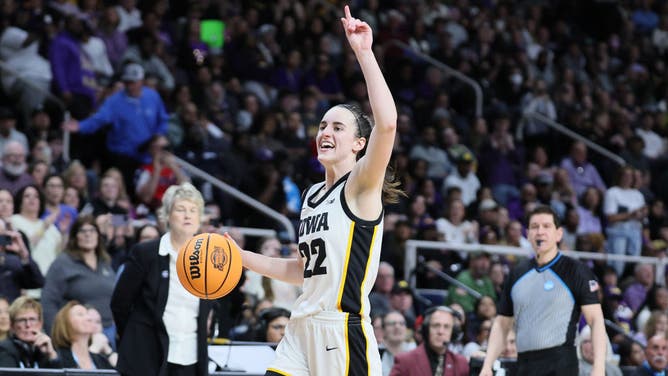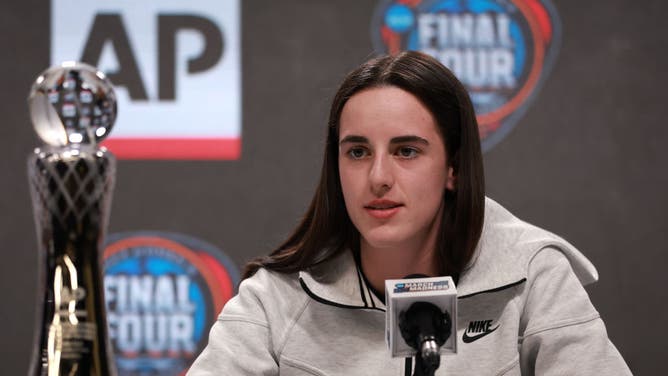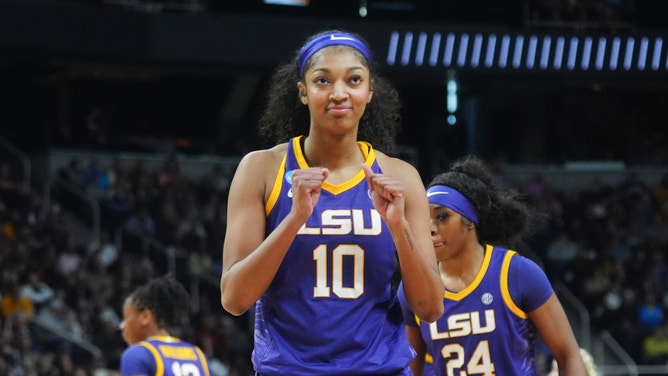Caitlin Clark Became An Icon By How She Plays, Not Because She's White | Glenn Guilbeau
I was speaking to one of my favorite all-time sports writers recently, and he captured Caitlin Clark's iconic rise to America's Sweetheart perfectly.
"What makes Caitlin Clark singular is the combination of her shooting and passing skill, the confidence with which she plays, national familiarity after staying for four years unlike top male stars, and her arrival at a time when the women's game has never been more respected overall and more accessible via TV, streaming, social media and commercial sponsors via Name, Image & Likeness opportunities."
READ: Caitlin Clark Is College Basketball's Tsunami
Excellent points all the way around. Women's basketball has been steadily rising in recent years, and the female Steph Curry arrived at the perfect time as Clark is the only player - man or woman - other than Curry, who routinely shoots from around 30 feet since Pistol Pete Maravich (1967-70 at LSU).

Iowa point guard Caitlin Clark flashes her winning smile as the final seconds tick off Monday night in Albany, New York, in her team's win over LSU to reach the Final Four. (Getty Images)
If you are among the few who have not already, watched Caitlin Clark Sunday afternoon (3 p.m., ESPN) when No. 1 seed Iowa (34-4) plays No. 1 seed South Carolina (37-0) for the national championship in Cleveland.
RELATED: Close Call, But Right One Vs. UConn
Iowa beat No. 3 seed Connecticut (33-6) in a Friday night thriller, 71-69, in a national semifinal at the Final Four. South Carolina beat No. 3 seed North Carolina State (31-7) in the other semi on Friday night, 78-59.
Caitlin Clark Is A 3-Tool Superstar For The Ages
Clark is the greatest player in women's college basketball history because she excels at three parts of the game. The other great ones tend to do that in only two. Clark leads the nation in scoring (32 points a game, 5 ahead of No. 2) and assists (9.0, 2 assists better than No. 2) and averages 7.3 rebounds a game. She had nine Friday night on the defensive side. This is why she leads the nation in triple-doubles with six. The closest to her is three away.
Clark has the vision of a Tom Brady and the deep ball accuracy as well.
And for premium enjoyment, try watching the game colorblind. Don't listen to much of the media, other than OutKick.com, of course. Don't listen to ESPN's Jemele Hill, who continues to struggle to accept the fact that the greatest women's college basketball player right now and arguably ever is white.
There is a lot of that going around. ESPN's Jay Williams bristled with irritation on GameDay back on Feb. 17 as Clark was obviously rising above all others and ESPN's Jay Bilas lauded her.
Caitlin Clark Is A ‘Cultural Phenomenon’
"She's a cultural phenomenon unlike anything we've ever seen in basketball in my view," Bilas said. "It goes beyond just the scoring records. She's not just elevated the women's game. She's elevated the game."
The camera flipped back to Williams, who was literally taken aback. He sat back in his chair, frowned and rolled his eyes up.
"And in that regard," Bilas continued, "we'll not see her like again in my judgment."
Williams couldn't take it anymore and responded in high whine, "But what happens is the way everybody sells her all the time, almost like she's already stamped as one of the greatest to ever do it."
"She is one of the greatest to ever do it," Bilas said. "She is," added co-host Seth Greenberg. "She is," added co-host Andraya Carter, who is black.
Williams and Hill are not alone.
After praising Clark above, my admired sportswriter friend said, "But we must also ask whether Clark would receive the same attention if she was black."
Actually, no we don't.
Wow. It's almost like some media members have to display their liberal identification card for fear it may expire. Was he asked by ESPN to offer a counter vs. Clark because she's white?
This notion is ridiculous.

Iowa's Caitlin Clark speaks to reporters after winning the Associated Press Player of the Year award for the second straight year on Thursday in Cleveland, Ohio, site of the Final Four Friday and Sunday. (Getty Images)
First of all, there is not another player - white or black, man or woman - to compare Clark to as far as her career point total in four seasons, other than Pistol Pete Maravich's numbers in three seasons. Clark is at 3,921 career points entering Sunday's game. She broke Maravich's record of 3,667 that many thought would never fall last month.
Maravich set his record in his senior season of 1969-70 when freshmen could not play on the varsity. Through 54 seasons after that, Clark is the only player to get close to his record in four seasons. Detroit Mercy's Antonio Davis came within three of tying Maravich's record in the 2022-23 season and got a decent amount of attention. But nothing like Clark, because Davis was a scorer only and played for a bad team in a weak conference that was barely on television.
Had a black women's or men's player gotten that close in four seasons in a program like an Iowa, he or she would have received the same amount of iconic attention Clark has received. Because of the way Clark plays, period. No one since Maravich has scored as much as her, and no one has done it with such deep shots. That's the difference - not the skin tone. NIL, which has Clark on major television commercials, has also helped.
But the main thing is the scoring and her style. That's why Maravich, whom black players in the NBA praised for playing like he was black, became an icon. It wasn't because he was white. People tuned in and went to the games because of the points, and his style.
Clark was virtually unknown nationally outside of women's basketball circles until she put up back-to-back, Maravich-like games late in the NCAA Tournament last April. She scored 41 against Louisville to reach the Final Four and 41 against No. 1 and then 36-0 South Carolina to reach the national championship game.

LSU forward Angel Reese was the biggest star in women's college basketball until about this time last year. (Getty Images).
Before those two games, LSU forward Angel Reese was the most well known women's college basketball player nationally. If Reese was a guard and white and scoring like Caitlin Clark since last April, she would be receiving the same amount of attention as Clark. If not more, because of Reese's more dominant and interesting personality, albeit too often overly dramatic. Clark only passed Reese in NIL earnings well into this season.
RELATED: Diana Taurasi Waves Angel Reese Buh-Bye
Many other black players before Clark would have also received the same amount of iconic attention, if not more, because of their personalities, had they scored as much as Clark and from where she scores.
Many Black Players Would Have Received Caitlin Clark Attention With The Points
The list of such black players is huge. UConn's Maya Moore, Tennessee's Chamique Holdsclaw and Candace Parker, USC's Cheryl Miller and Lisa Leslie, LSU's Seimone Augustus and Marie Ferdinand, North Carolina's Ivory Latta, Baylor's Brittney Griner, Texas Tech's Sheryl Swoopes and Virgnia's Dawn Staley, just to name a handful. There are many others.
And look out for USC's JuJu Watkins, who will be a sophomore next season after scoring 920 points this season. Clark had only 799 and 863 points in her first two seasons. Watkins will get as much, if not more, attention, if she approaches Clark's numbers in 2027.
And if and when that happens, we will revisit.
And oh, by the way, Earvin "Magic" Johnson got as much or more attention at Michigan State than Indiana State's Larry Bird at Indiana State did in the 1970s. And again as both became NBA superstars with the Los Angeles Lakers and Boston Celtics, respectively, in the 1980s. And Michael Jordan became more iconic than anyone in the 1980s and '90s.
And do I need to mention Tiger Woods in that very white sport of golf?
Someone also told me this: "South Carolina, with a predominantly black roster, finished undefeated the last two regular seasons, but did not receive anywhere near the attention that Clark has."
Wrong again. South Carolina is 73-1 the last two seasons, but that is without a major scorer in either season. It's all about the scoring. South Carolina's leading scorer averaged 15 points a game last year and 14 this year. It's a balanced, cohesive team, which tend to be boring whether black or white. Efficiency doesn't sell as well as logo 3s.
So enjoy the national championship game Sunday, but try not to watch it in black and white.
(Please share your comments on this column by emailing me at glenn.guilbeau@outkick.com or via X @SportBeatTweet.)